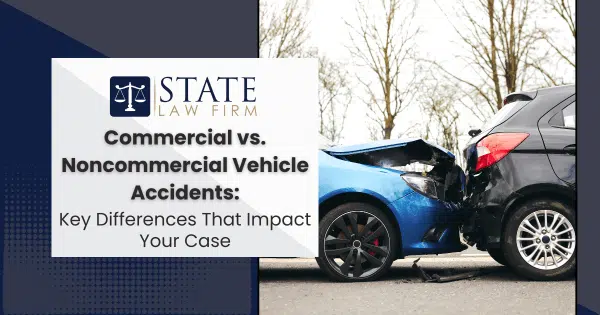Every collision is a story—especially when that collision involves a vehicle used for business. Whether you’re dealing with a semi‑truck weaving through traffic or a personal vehicle run-of-the-mill fender-bender, the road to resolution looks very different depending on whether the vehicle is comercial o noncommercial. At State Law Firm, our young team of evolving litigators sees these distinctions not just as legal mechanics, but as powerful tools to craft the strongest possible case for each client.
Consider this: in 2023, large trucks were involved in 5,375 fatal crashes—an 8.4% drop from the year before, yet still a 43% increase over the past decade. These heavyweight vehicles now account for 9% of all cars in fatal crashes, despite representing just 10% of total vehicle miles traveled. That means when a commercial vehicle is involved, the aftermath is often more complex, the stakes are higher, and the law treats it differently.
In this guide, we’ll walk you through the fundamental distinctions—starting with what legally defines a commercial versus a noncommercial vehicle, the shifting landscape of liability, how insurance coverage and claims differ, what that means for injury compensation, and why the details of evidence collection matter even more in these cases.
In the meantime, if you’ve been injured in a bus crash in Fresno, you may benefit from working with a Fresno bus accident attorney. And if you’re ready to take the next step, feel free to request a free consultation—we’re here to listen, explain, and advocate.
Understanding the Basics: What Constitutes Commercial and Noncommercial Vehicles?
At its core, the difference between a comercial and a noncommercial vehicle comes down to purpose.
- Commercial vehicles are primarily used for business purposes—think delivery vans, rideshare vehicles, buses, and tractor-trailers.
- Noncommercial vehicles are typically used for personal or household transportation, like your family car or motorcycle.
California law often looks beyond the size of the vehicle and considers factors such as who owns it, how it’s used, and whether it’s registered for commercial purposes. For example, a pickup truck may be a personal vehicle for one driver but a commercial vehicle for another if it’s registered to a business and used for work.
Consejo profesional: Always confirm how your vehicle is classified on your registration and insurance policy—this can directly affect liability, insurance coverage, and even the damages available in a lawsuit.
Legal Implications: How Liability Differs Between Commercial and Noncommercial Accidents
Liability rules can look similar on the surface, but the parties involved in a commercial accident are often more numerous—and more financially responsible—than in a personal accident.
In a noncommercial accident, liability usually focuses on the at-fault driver. In commercial accidents, liability may extend to:
- The driver’s employer or contracting company
- The vehicle’s owner (if different from the driver)
- Maintenance providers or parts manufacturers
This broader scope often gives injured parties more potential avenues for recovery. However, it can also mean more complex litigation, with multiple defendants pointing fingers at each other. That’s where an experienced legal team makes a difference—untangling the web of potential liability so your claim is not diluted.
The Role of Insurance: Coverage Differences in Commercial vs. Noncommercial Vehicle Accidents
Commercial vehicles are typically covered by commercial auto insurance policies, which have higher coverage limits and broader protections. These policies often include:
- Higher liability coverage (sometimes millions of dollars)
- Coverage for multiple drivers under one business policy
- Additional protections like cargo insurance
By contrast, personal auto insurance generally has lower policy limits, and payouts can be exhausted more quickly in severe injury cases.
Consejo profesional: Never assume the other driver’s insurance will cover your losses—especially in severe accidents. Identifying whether the vehicle is commercial can unlock significantly larger coverage pools.
Injury Claims: Navigating Compensation for Both Types of Accidents
The injury claims process starts the same way—document your injuries, gather evidence, and seek medical attention. But the differences become clear as soon as you file your claim:
- Commercial vehicle accidents often involve corporate legal teams and insurance adjusters trained to minimize payouts.
- Noncommercial accidents usually involve direct communication with a personal auto insurer.
Compensation may include:
- Medical expenses (current and future)
- Lost wages and reduced earning capacity
- Daños por dolor y sufrimiento
Because commercial insurers have more resources to fight claims, working with an attorney early can be crucial to leveling the playing field.
The Importance of Evidence Collection in Each Case Type
In both accident types, evidence can make or break your case—but commercial accident evidence is often more extensive and time-sensitive. Examples include:
- Driver logbooks and GPS data
- Vehicle maintenance records
- Dashcam or surveillance footage
- Employment contracts and company policies
Preserving this evidence quickly is critical—some records may be routinely destroyed after a short period. A skilled attorney can issue preservation letters to ensure vital information isn’t lost.
Understanding the Key Differences Can Enhance Your Legal Strategy for Vehicle Accident Cases
Whether you’re dealing with a multi-car pileup caused by a commercial truck or a two-car collision in your neighborhood, knowing the distinctions between these accident types can influence everything—from how liability is assigned to the compensation you receive.
The more you understand these differences, the better equipped you’ll be to protect your rights. If you’ve been injured and aren’t sure which category your case falls into, we can help you find out. Our team is ready to investigate, advocate, and push for the maximum recovery possible—no matter how complex the case.
If your situation involves a bus collision, remember that working with a Fresno bus accident attorney could make all the difference. And if you’re ready to talk strategy, you can request a free consultation hoy.


